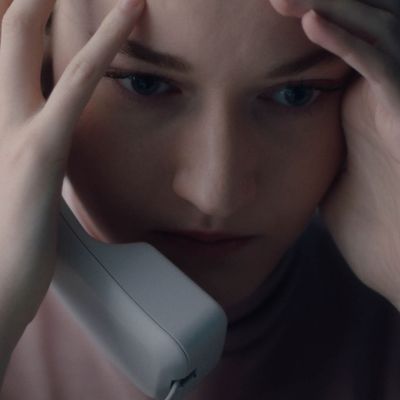
Whenever Jane (Julia Garner) has to write an apology email to her boss, the other assistants in the room reflexively come up behind her to suggest wording. “It’s not my place to question your decisions,” they murmur over her shoulder as she types, “I’m grateful for the continued opportunity.” It’s a ritual of abasement to which they’ve obviously become accustomed. Jane, on the other hand, is still learning the ropes at the New York film company at which The Assistant is set. She occupies the lowest rung on the ladder, which is why she has to arrive first, in the pre-dawn darkness, to open up the office. It’s also why she puts on gloves and cleans up whatever new stains have been deposited on the couch in the chairman’s office. The expression on her face when she does this is the same as the one that’s there when she washes the dishes left in the kitchen by co-workers who don’t even seem to see her. It’s the tight, pallid look of someone trying to get through things without thinking too hard about what she’s doing.
That the man Jane is working under in The Assistant is a stand-in for Harvey Weinstein is understood. He’s never named and he never appears onscreen, an approach that echoes how filmmaker and former Weinstein assistant Leslye Headland wrote about her old workplace in her 2008 play Assistance. The Assistant shares an understanding that the man himself is less psychologically interesting than the people around him, and how they’ve learned to tolerate, accommodate, rationalize away, or internalize his behavior. What makes the film such a spare but searingly insightful treatment of the issues at the core of Me Too is the way it refuses to separate its unseen executive’s sexual predation from the larger structures that enable it. The environment revolves around certain unspoken but understood rules of abuse — namely, that abuse is something that you have to put up with until you’re powerful enough to be amused by or dismissive of it when it’s directed at others. And here it’s women, especially women that the chairman finds desirable, who receive a disproportionate amount of it.
The Assistant is the first scripted feature from writer-director Kitty Green. For her last film, the 2017 documentary Casting JonBenet, Green put out a call to Colorado-based actors to try out for the major roles in the unsolved 1996 child murder, and, while they were there, to offer up their own theories and recollections. It was an excavation of our true-crime obsession that was illuminating, chilly, and occasionally cruel in its pitiless use of its eager-to-please interviewees. That same sense of distance is there in The Assistant, but it serves the new film far better. The Assistant observes its main character, a recent college grad who has theoretically landed her dream job, with a detached interest, taking in her struggles and her complicity while offering her neither sympathy nor castigation. The camera pays closer attention to Jane than the people in her professional life, most of whom treat her as ranking somewhere above office furniture but not quite at the level of actual human. In one sequence, she shares an elevator with Patrick Wilson, apparently playing himself, and the way they awkwardly attempt to exit at the same time suggests he hadn’t even realized she’d been standing next to him.
The Assistant takes place over the course of a grueling but typical day for Jane — an airless trudge through phone calls and photocopies that deviates from the norm only when she decides to stop by human resources to file a complaint. She does this not on her own behalf, but because of the new assistant the chairman has decided to add to the pool — a painfully young and pretty former waitress from Idaho (Kristine Froseth) that he met at a conference and offered a job to. It’s hard to tell whether Jane is moved to action because she sees herself in the new girl, whom she nevertheless escorts to her boss’ hotel of choice. It seems just as possible that she acts because she doesn’t see any of herself in the new girl; the hiring lays bare how arbitrary their employment is. It’s not work or experience that matters, it’s the demanded displays of loyalty and subservience — and in that light, fielding calls from your boss’ angry wife and (maybe) trading sexual favors with him are all regarded as the same thing.
The scene in HR that follows, and that involves Matthew Macfadyen, with a smile full of razors, makes the dilemma of Jane’s position apparent. He suggests she’s jealous, that she’s overreacting, that she’s denying the agency of grown women, and that’s she throwing away a prime opportunity for the sake of a whim. And once he’s worn her down to a nub, he assures her, “I don’t think you have anything to worry about. You’re not his type.” There’s nothing about Jane, whom Garner plays with a rabbity air of uncertainty, that suggests she’ll ever speak up again. She’s a girl from a nice home who went to a good school, and she’s doing what she’s been told she ought to in order to rise through the ranks. When her boss gives her the verbal equivalent of a pat on the head after one of his outbursts — “I’m tough on you because I’m gonna make you great” — it’s easy to imagine Jane as one of the few older women executives in the office, who roll their eyes at everything she struggles to bear witness to, having long ago accepted that it’s all part of the business.
More From This Series
- The First Cinematic Masterpiece of 2021 Is Here
- Promising Young Woman Is an Incendiary Revenge Movie With a Sugar-Sweet Shell
- The Forty-Year-Old Version Isn’t the Quirky Underdog Comedy It Might Sound Like


